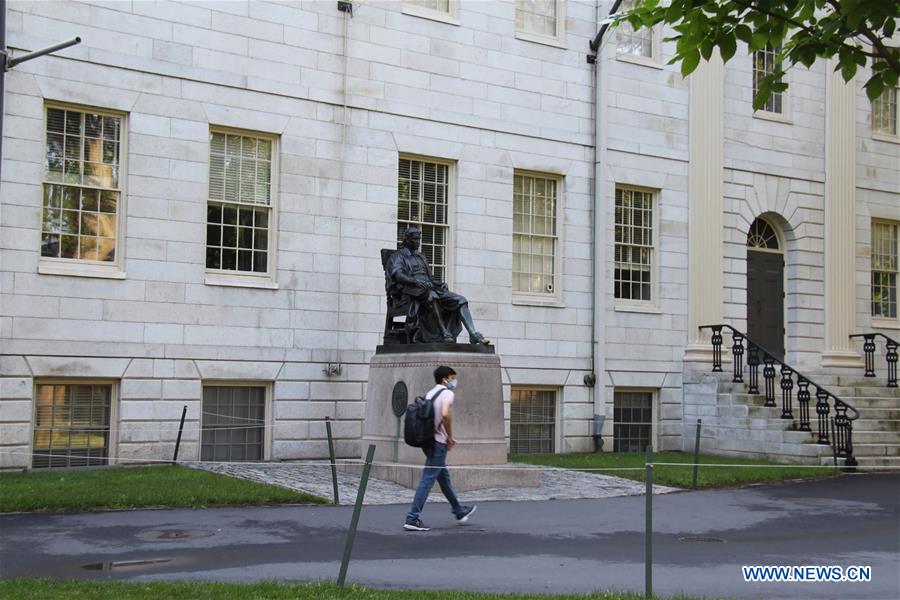Coronavirus and Trump's policies hurting beleaguered American universities
- By Mitchell Blatt
 0 Comment(s)
0 Comment(s) Print
Print E-mail China.org.cn, September 16, 2020
E-mail China.org.cn, September 16, 2020

The rise of Asia is evident in the latest world university rankings released by Times Higher Education (THE). So are the developing challenges for American higher education.
University World News reported that "Asian institutions are performing better," particularly Chinese ones, which now make up over one-fifth of the universities on the THE and QS rankings. In fact, Tsinghua University became the first ever Asian school of higher education to make the top 20, while fifteen other Asian universities occupied spots in the top 100.
Despite that Asia is rising, American and British universities still form much of the elite. The University of Oxford is still number 1. Stanford, Harvard, the California Institute of Technology, and MIT occupy the next four spots. So the U.S. isn't lacking in quality universities.
However, the further you look down the list, the more American universities begin to drop off. "U.S. institutions outside the top 200 show signs of decline," THE's report stated. That includes many of the lower part of the upper and middle tier universities that middle-class Americans rely upon.
The continuing success of America's elite schools masks larger problems facing the American higher education sector affecting all schools. First, tuition costs continue to rise unabated, a problem particularly grave at elite schools. The cost of a four-year undergraduate degree rose by 25% from 2008 to 2018. That's over $20,000 a year for a public in-state university, and nearly $50,000 a year for private or out-of-state.
University administrators are spending exorbitantly on unnecessary gimmicks to attract students and constructing high-priced new buildings. On the public side, education funding in 41 states has been cut, so students and families have to pay more for what was once considered a class of public good.
The increases in tuition fees and a perception that universities are instructing students in snobbish critical theories disconnected from the real world has contributed to an ongoing decline in the percentage of Americans who are confident in their nation's higher education system.
But now, COVID-19 and American xenophobia are putting added pressures on American universities. Consider, for example, students at Harvey Mudd College paying $75,000 a year for their education. That's the highest in the country. This fall, their education will take place completely online.
Over 51,000 students and faculty at institutions across the country have been infected by the virus that President Trump has allowed to run rampant. Many universities are closed to in-person classes; in contrast, universities in China and many other Asian countries are open.
Coronavirus has made it harder for people to travel internationally. It has also reduced the desirability of studying in America for foreign students. Why spend thousands of dollars on flights and expensive housing when you're just going to be taking classes online?
Combine coronavirus with a xenophobic president who makes it difficult for foreigners to obtain visas and increasing incidence of hate crimes against minorities, particularly, since 2020, Asians, and it is no surprise that America is a less desirable destination for foreign students.
According to the latest QS Applicant Surveys, Canada, Australia, and the U.K. have all risen in popularity relative to the United States when it comes to where students wish to study. Demand is decreasing overall, however.
Trump's visa restrictions and travel bans are reducing the number of students who can study; foreign students in the U.S. decreased by 10% from 2015 to 2018. Over the same period, foreign students in Canada and Australia rose significantly.
Trump's recent decision to kick out 1,000 Chinese students with lawful visas, while offering no justification, only exacerbates the problem of attracting and retaining foreign talent. A document drawn up by some of the students affected shows some were studying sociology, not a major with a connection to national security whatsoever. Another student was in the process of applying for an H1-B visa. Is the U.S. trying to block its own companies from hiring engineers?
All of these controversies are going to cause the United States to struggle to attract qualified workers, scientists, and researchers. Foreign students do important research work at university labs, the results of which enhance America's knowledge base and university patent acquisition.
They also pay full freight in tuition fees. According to the NAFSA: Association of International Educators, America's anti-student policies will cause them to lose over $3 billion in revenue and lead to 100,000 job losses in the overall American economy.
Meanwhile, with Chinese universities enhancing their reputations, Chinese students won't have to leave their country to obtain an elite education any longer.
Mitchell Blatt is a columnist with China.org.cn. For more information please visit:
http://www.china.org.cn/opinion/MitchellBlatt.htm
Opinion articles reflect the views of their authors, not necessarily those of China.org.cn.
If you would like to contribute, please contact us at opinion@china.org.cn.






Go to Forum >>0 Comment(s)